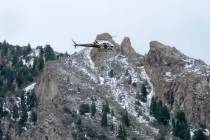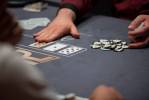Strokes stoke ‘Eskimo’ legend
When Paul "Eskimo" Clark collapsed twice after suffering strokes during a World Series of Poker tournament last month and refused to leave the game, an informal side wager was offered up among gamblers at the Rio.
Which was more likely, Eskimo dying or winning the tournament?
Some gamblers figured the odds were about even.
The winner of today's 2007 main event will likely have been determined late Tuesday, or in the wee hours today. But part of this year's lore was written June 18, when Paul "Eskimo" Clark suffered 14 strokes, which some characterized as "mini-strokes." Still, the three-time World Series of Poker bracelet winner and Las Vegas poker pro refused to leave the table.
"I'm the chip leader," he told paramedics, according to friends and witnesses. "I'm not going nowhere."
The tale is tough to pin down, as is the man himself.
Eskimo isn't talking, at least to the media.
To reach him, you go through "Barracuda," Clark's friend and business partner. If Ken "Barracuda" Knight answers his phone, he'll tell you the story. Maybe he'll tell you where Eskimo is supposed to be.
But Eskimo isn't always where he's supposed to be. However, people there on that June day were willing to give an account.
Event 29 was the $1,500 buy-in, seven card "razz" tournament. It drew 341 players, including some top pros.
Gary Wise, of ESPN.com, called it a "solid field of professional grinders."
The game is considered one of the most maddening because instead of trying to get the highest hand, players try to get the lowest hand.
"This is a game that could cause one to have multiple strokes," Wise said.
Eskimo is from New Orleans and acquired his nickname, the story goes, for his resemblance to the Eskimo in the Alaska Airlines logo. He had been having health troubles over the past year. But things started out well for him as the tournament began.
By the start of the second day, he had the most chips. But that's when his health problems caught up with him.
Later that day he collapsed, with his right side going numb. The tournament was suspended. When play resumed, Eskimo collapsed again and paramedics were summoned.
The tournament took an early and extended dinner break.
When Eskimo refused medical attention, tournament officials had to decide whether they would allow him to continue and, if they did, how would they respond if he collapsed again.
"We have to allow people to play who are, let's be honest, not in the best of health," said Nolan Dalla, public relations director for the tournament. "There was really no precedent for this."
Eskimo had to sign an agreement holding the tournament harmless for any physical damage he suffered. He also agreed to leave if he collapsed again.
His friends also weighed whether they should intervene and take him to a hospital.
"He made me promise I wouldn't pull him" from the tournament, Barracuda said. "He said, 'Kenny, promise me, you're not going to do that. Promise me.' "
At that point, word of Eskimo's health began circulating on blogs and in poker rooms.
This was gambling's version of Boston Red Sox ace Curt Schilling pitching as blood soaked his sock in that other World Series. This was Willis Reed limping onto the court for Game 7 of the 1970 NBA Finals to lead the New York Knicks to victory.
But there was also recognition of a darker side to Eskimo's decision to continue playing.
"The entire episode has left observers feeling philosophical, wondering at which point a man's health supersedes his dreams," Wise wrote on ESPN.com. "Now in his 60s, poker has become the man's life."
At some point after his second collapse, players floated the proposition bet of which was more likely: Eskimo taking the title or the strokes taking Eskimo.
Barry Greenstein, a top professional poker player who was at the Rio during the tournament, said he doesn't know if anyone actually put money down on it. But looking back, he figures both sides had about an equal shot.
The next day, play resumed.
Eskimo had made the final table. But he "stroked out," as Barracuda put it, and became incoherent. He made bad plays and lost a good portion of his chips.
"I'm literally holding him in his chair," said Barracuda, who has known Eskimo for 12 years. "He couldn't move his right arm at all. His whole right side went numb.
"When he came out of the stroke, he said, 'Kenny, where's my chips?' " Barracuda said. "I told him I couldn't do anything. I'm not allowed to say anything" during play.
Eskimo finished fourth and took home $31,186. As soon as he picked up his winnings, Barracuda rushed him to the veterans hospital at Nellis Air Force Base.
The hospital kept Eskimo for 3 1/2 days.
A couple of weeks ago, Barracuda described his friend as "weak as a puppy." His speech is slurred, maybe permanently.
When Barracuda asked him if he had any regrets, "He said absolutely not. If he died on the table, that would be fine with him."
Greenstein has known Eskimo for two decades.
"I play poker to support my life; that's how I make my living," Greenstein said. "Eskimo seems to live to play poker."
Eskimo was spotted recently at a tournament at the Bellagio and another at The Orleans. If he played in them, he didn't play for long.
But no matter how he performs from now on, his commitment to poker can't be questioned, Wise said.
"People are now going to look at him and say, 'Hey. That's the guy who was willing to die to win.' "
2007 World Series of PokerNews, information























